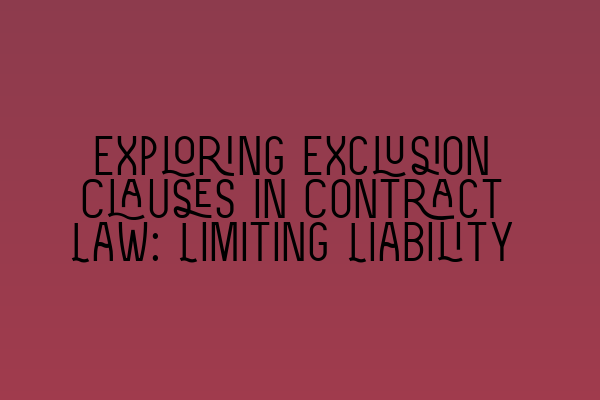Exploring Exclusion Clauses in Contract Law: Limiting Liability
Welcome to SQE Contract Law, your go-to source for legal insights and expertise. In this blog post, we will delve deep into the world of exclusion clauses in contract law and how they can be used to limit liability. Whether you are a business owner, an entrepreneur, or simply interested in understanding the intricacies of contract law, this article will provide you with valuable information to navigate this complex terrain.
The Purpose and Function of Exclusion Clauses
Exclusion clauses are provisions in a contract that seek to limit or exclude one or both parties’ liability for certain types of loss, damage, or injury. These clauses serve as risk management tools, allowing parties to allocate risk and protect their interests in the event of unforeseen circumstances or breach of contract.
For instance, imagine you are a business owner contracting with a supplier to provide goods or services. You may want to include an exclusion clause to safeguard your business from potential losses in case the supplier fails to deliver on time or provides subpar quality products.
It’s important to note that exclusion clauses must be carefully drafted and clearly worded to be enforceable. Ambiguous or unfair clauses may be deemed unreasonable or against public policy, rendering them unenforceable.
Understanding the Types of Exclusion Clauses
Exclusion clauses can take various forms and can be categorized into three main types:
- Exclusion Clauses: These clauses seek to exclude liability for all types of loss or damage, including negligence, breach of contract, or any other cause. Parties relying on these clauses can effectively absolve themselves from liability entirely.
- Limitation Clauses: Unlike exclusion clauses, limitation clauses do not aim to eliminate liability entirely. Instead, they seek to cap the amount of liability that can be claimed by the aggrieved party. These clauses are often used in high-risk industries to limit potential damages.
- Indemnity Clauses: Indemnity clauses require a party to compensate the other party for specified losses or expenses. These clauses may go beyond limiting liability and impose an obligation to indemnify or hold harmless the other party from certain risks or damages.
When drafting and negotiating contracts, it is crucial to consider the specific circumstances and goals of each party involved. The type of exclusion clause used can significantly impact the rights and responsibilities of the parties, so seeking legal advice is advisable to ensure fairness and enforceability.
Factors Affecting Enforceability
While exclusion clauses can be a useful tool in risk management, their enforceability is subject to certain legal considerations. It’s essential to be aware of these factors to ensure the validity of an exclusion clause:
- Unreasonable Exclusion: An exclusion clause that attempts to exclude liability for personal injury or death caused by negligence may be considered unreasonable and unenforceable.
- Notice Requirements: For an exclusion clause to be valid, it is vital to bring it to the attention of the other party before or at the time of contract formation. The clause should be clearly displayed and not hidden within a lengthy contract document.
- Implied Exclusion: Sometimes, statutory provisions or legal principles may imply restrictions on the scope or enforceability of exclusion clauses. For example, consumer contracts typically enjoy more protection, and certain rights cannot be excluded or limited.
Understanding these factors and staying updated on the latest legal developments is crucial to ensure compliance and mitigate potential disputes in contract law.
Seeking Legal Advice for Effective Exclusion Clauses
Given the complexity of contract law and the potential consequences of poorly drafted exclusion clauses, it is highly recommended to seek professional legal advice when dealing with these matters.
At SQE Contract Law, our team of experienced solicitors specializes in contract law and can provide you with expert guidance tailored to your specific needs. Whether you are drafting a new contract, reviewing an existing one, or facing a potential dispute, our solicitors can assist you in ensuring your exclusion clauses are fair, enforceable, and in line with legal requirements.
For further insights into different aspects of contract law, be sure to check out our related articles:
- Exploring the Impact of Frustration on Contractual Obligations: Legal Insights
- Interpreting Contractual Clauses: Unlocking the Hidden Meanings
- Legal Aspects of Business Contracts: Key Considerations for Entrepreneurs
- Agreements in Contract Law: Understanding Its Various Types
- Essentials of Consideration: Understanding the Basis of Contractual Exchange
By engaging with our comprehensive range of articles and seeking professional legal advice, you can empower yourself with the knowledge and expertise necessary to navigate the complex world of contract law confidently.
Remember, when it comes to exclusion clauses and contract law, being well-informed is the key to protecting your interests and ensuring the enforceability of your agreements.
